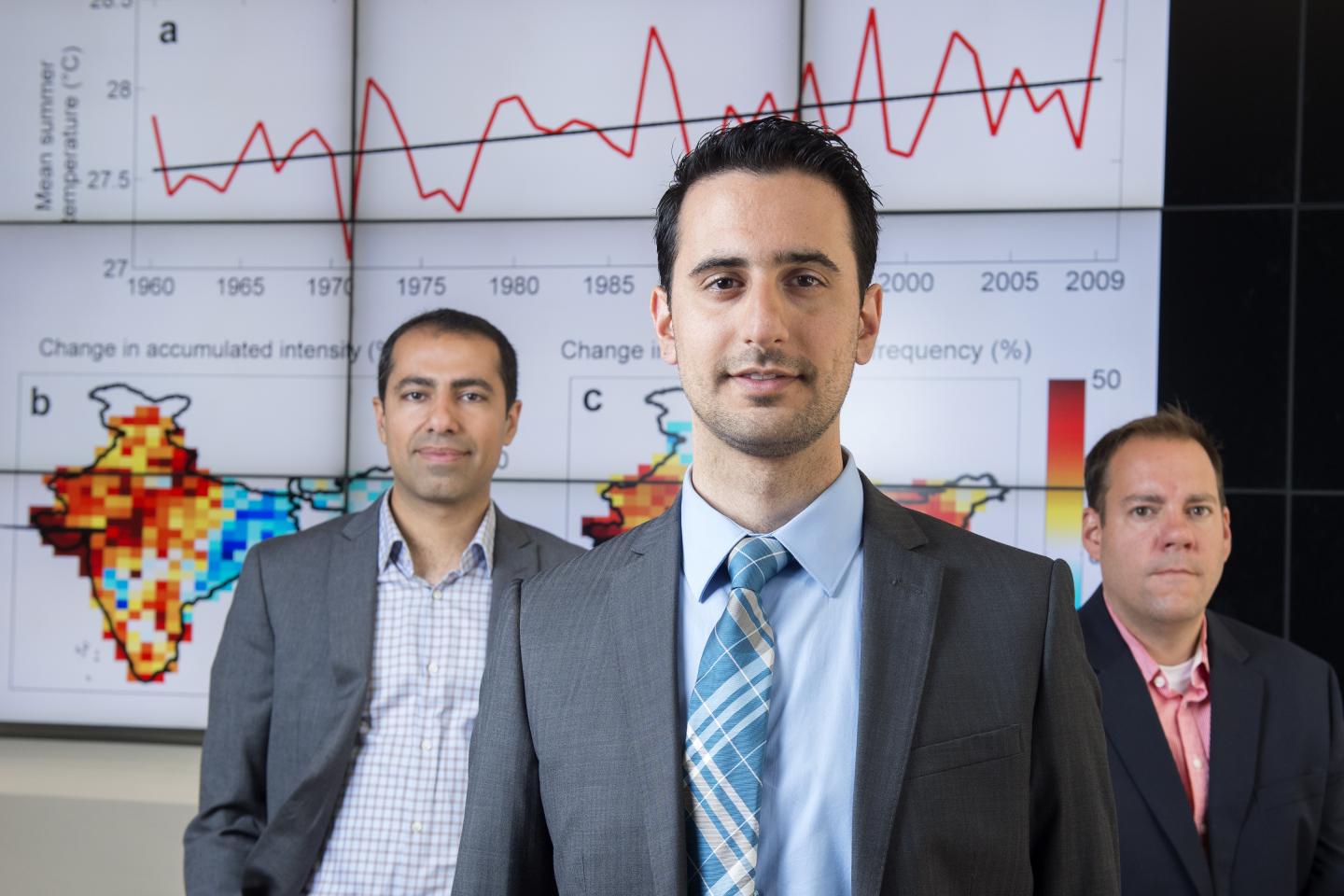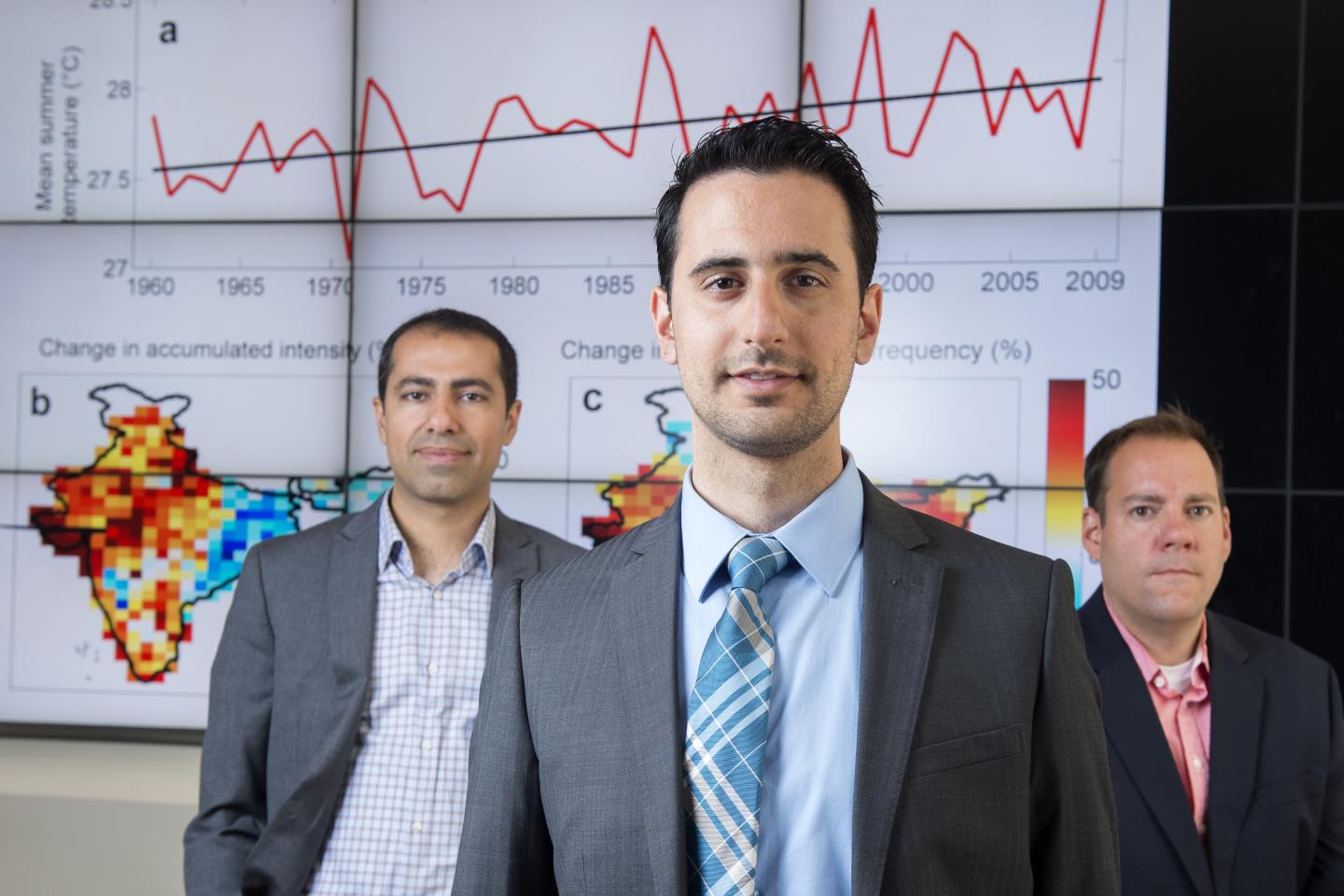
Credit: Steve Zylius / UCI
Irvine, Calif., June 7, 2017 — An increase in mean temperature of 0.5 degrees Celsius over half a century may not seem all that serious, but it's enough to have more than doubled the probability of a heat wave killing in excess of 100 people in India, according to researchers at the University of California, Irvine and other institutions.
This could have grim implications for the future, because mean temperatures are projected to rise by 2.2 to 5.5 degrees Celsius by the end of this century in the low- and mid-latitude countries of the Asian subcontinent, the Middle East, Africa and South America.
"The impact of global climate change is not a specter on the horizon. It's real, and it's being felt now all over the planet," said Amir AghaKouchak, UCI associate professor of civil & environmental engineering and co-author of the study, published today in Science Advances. "It's particularly alarming that the adverse effects are pummeling the world's most vulnerable populations."
Using data gathered by the India Meteorological Department from 1960 to 2009, the UCI-led team analyzed changes in summer temperatures; the frequency, severity and duration of heat waves; and heat-related deaths.
They found that when mean summer temperatures in the South Asia nation went from 27 to 27.5 degrees Celsius, the probability of a heat wave killing more than 100 people grew from 13 percent to 32 percent – an increase of 146 percent.
In real terms, there were only 43 and 34 heat-related fatalities in 1975 and 1976, respectively, when the mean summer temperature was about 27.4 degrees Celsius. However, at least 1,600 people died from excessive heat in 1998, when the mean summer temperature was higher than 28 degrees Celsius.
The average number of heat wave days over the five-decade study period was 7.3 per year. The most heat wave days occurred in 1998 (18), when 1,655 people died, and 2003 (13), when 1,500 people died.
A global issue
India is currently home to over 1.3 billion people, nearly a quarter of whom live on less than $1.25 a day and have little to no access to electricity.
"In addition to India, populations in other developing countries in low- to mid-latitude regions are especially hard hit by these extreme heat events," said lead author Omid Mazdiyasni, a UCI graduate student in civil & environmental engineering. "They lack air conditioning that people in richer countries rely on when the heat is unbearable, and they don't have funds to escape to cooler climates."
The study authors stressed that their findings should serve as a wake-up call for governments and international organizations to help improve the resilience of areas most vulnerable to climate change-induced weather events. But in the wake of last week's news of the United States withdrawing from the Paris climate accord, they acknowledged the difficulty in building a broad-based coalition to tackle the issue.
"Given the quantifiable impacts of climate change in India and other developing nations in the coming decades, both rich and poor countries should be ramping up our efforts to combat global climate change instead of turning our backs on commitments we have made to the international community," said co-author Steven J. Davis, UCI associate professor of Earth system science.
###
Researchers from UCLA, Boise State University, the Southern California Coastal Water Research Project, the Indian Institute of Technology Bombay and the Indian Institute of Technology Delhi also participated in the study, which was partially supported by the National Science Foundation.
About the University of California, Irvine: Founded in 1965, UCI is the youngest member of the prestigious Association of American Universities. The campus has produced three Nobel laureates and is known for its academic achievement, premier research, innovation and anteater mascot. Led by Chancellor Howard Gillman, UCI has more than 30,000 students and offers 192 degree programs. It's located in one of the world's safest and most economically vibrant communities and is Orange County's second-largest employer, contributing $5 billion annually to the local economy. For more on UCI, visit http://www.uci.edu.
Media access: Radio programs/stations may, for a fee, use an on-campus ISDN line to interview UCI faculty and experts, subject to availability and university approval. For more UCI news, visit news.uci.edu. Additional resources for journalists may be found at communications.uci.edu/for-journalists.
NOTE TO EDITORS: PHOTO AVAILABLE AT https://news.uci.edu/research/small-climb-in-mean-temperatures-linked-to-far-higher-chance-of-deadly-heat-waves
Contact:
Brian Bell
949-824-8249
[email protected]
Media Contact
Brian Bell
[email protected]
949-824-8249
@UCIrvine
http://www.uci.edu
Original Source
https://news.uci.edu/research/small-climb-in-mean-temperatures-linked-to-far-higher-chance-of-deadly-heat-waves/
############
Story Source: Materials provided by Scienmag





